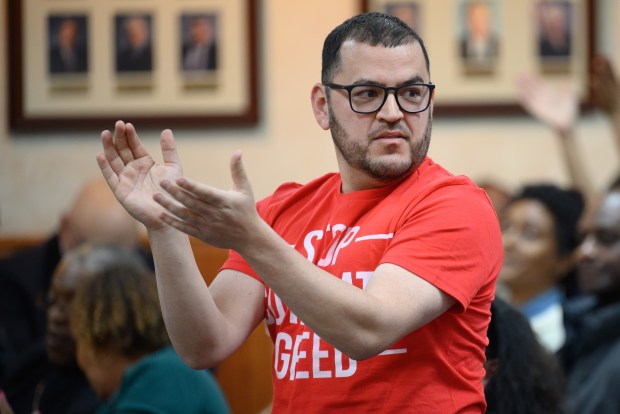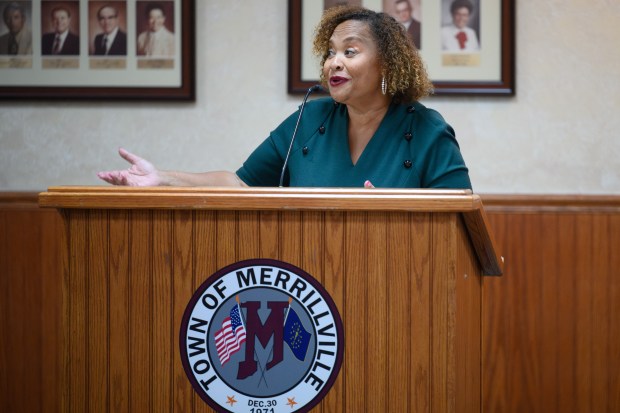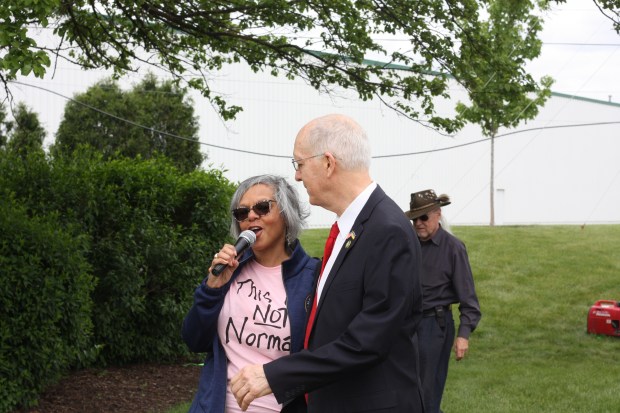A five-year battle to close the Merrillville Town Court ended Tuesday night by three changed votes.
With a vote of 5-0-2, the Merrillville Town Council voted to keep the Town Court open during its March 25 meeting. Council Vice President Rhonda Neal, D-1, who initially abstained from voting when the measure came back up in May, voted “Yes,” as did Council President Rick Bella, D-5, who’d been a consistent “No.”
In a second surprise change, Councilman Shawn Pettit, D-6, and Councilwoman Keesha Hardaway, D-7, abstained from voting after their “No” votes.
Hardaway, Pettit and Bella declined to comment as to why they changed their votes, but the joy among court supporters was palpable. Councilwoman Shauna Hayes-Edwards, D-2, was thrilled at the turn of events.
“I keep saying that if in four years, if things are bad, close it, but let the man (Merrillville Court Judge Eugene Velaszco) finish his term,” she said. “Now, we’re going to be able to do that.”
Bella, the Post-Tribune previously reported, pointed out that Velasco was caucused only to help close the town court since the vote to do so had already been cast and that he’d never proposed any plan to the council to make it viable. Velaszco remembered the situation differently.
“This has never been about money,” Velaszco said during public comment before the vote was taken. “I was voted in the day after they voted to close the court, then we get to March, and what happened? COVID, and we were shut down to the end of the year. I forced the lawsuit to try and get the decision changed, but Superior Court kept me from accepting new cases. So, from end of 2019 to the end of my first term, I got no new cases and therefore no money coming in.
“(What happened with the court previously) had nothing to do with me because all we did was try to administer the cases we had to generate money, and we did generate money.”
Former Merrillville Clerk-Treasurer Kelly White-Gibson added the potential difficulties residents could have if the court were closed.
“As an attorney, it’s not the court in Crown Point that you’ll be going to; you’re going to Hammond because it’s the least-stocked court,” she said. “That’s how far you’re going to have to drive.”
The Town Council voted to abolish the Town Court as of Dec. 31, 2020, saying it was losing money on top of having hundreds of thousands of dollars embezzled from it after former Merrillville Town Court clerk Virlissa Crenshaw pled guilty to stealing $176,763 in funds from the town in U.S. District Court in Hammond in 2016. A State Board of Accounts audit found $310,325 in missing bond payments, traffic tickets and ordinance violations, and said there could have been more money missing but some receipts had been shredded.
Velazco was granted an injunction in Lake Superior Court in January 2021 that stopped the court from shutting down until the matter could be heard and a certified public accountant completed a full audit of the court’s cash bond account. In turn, the Town Court, after reinstating its full operations, was instructed to wind down operations, not take on new cases, and start transferring more lengthy cases to Lake Superior Court, County Division.
The matter came up again in August 2022 when the Town Council planned to discuss closing the court Sept. 30, 2022, at a Town Council meeting. The item was met with blowback from the community, and attorneys for Lake County Clerk Mike Brown filed a motion enjoining his office to Velazco’s suit.
The council, via an order from Lake Superior Court Civil Division Judge Bruce Parent, subsequently amended the ordinance to remove the closure date and to provide that the clerk-treasurer, Lake County clerk of court and Indiana Office of Court Services would be given detailed instructions on winding down the town court. It passed in October 2022.
Velazco then filed a new lawsuit against the Town Council saying the amendments were so substantial, the ordinance should’ve been presented again on first reading, not second reading, court documents said. The two cases were consolidated and the parties each filed for summary judgment, which Velazco lost, according to court records.

Velazco then appealed, but the Court of Appeals in January denied his appeal because Velazco “was not only aware of the amendments to the ordinance; he participated in drafting them and ultimately agreed to them,” court documents show.
At the May 14 meeting, the council voted 3-3-1 on whether to reestablish the court; if a voting member of a body refuses to vote when a majority vote is required, their abstention is considered a “No” vote, according to the Indiana Code. The only way, then, that a Clerk-Treasurer would be called in to vote would be if there were an even number of councilors present at the vote, but since all of them were present, the ordinance failed by majority, or four votes.
Clerk-Treasurer Eric January, who believed his “right to vote” was being usurped, sought opinions from attorneys with the State Board of Accounts and Accelerate Indiana Municipalities (formerly known as Indiana Association of Cities and Towns) but told them there were three votes for and three votes against only, the Post-Tribune previously reported.
Once those attorneys were made aware that Neal was present and abstained from the vote, they clarified to him and Town Manager Michael Griffin that they were given “incorrect information” and that Svetanoff is “in the best position” to decide the matter; as well, they told them they had given January “technical advice,” not any sort of official ruling as January indicated.
Svetanoff said Griffin offered to get the Indiana Attorney General’s office to weigh in on the matter, but January declined and instead sued the council in September.
Parent, in a judgment filed December 26, ruled that Indiana Code provides that a town clerk-treasurer “is an ex officio member (of the town council) for the purpose of casting the deciding vote to break a tie,” but that the council precluded him from doing so during a May 14 vote to reestablish the court.
Using an “embarrassingly old copy of the Merriam-Webster Dictionary,” Parent wrote that a tie is defined as “an equality in number (as of votes)” or “an undecided or deadlocked contest,” according to court documents.
Because the vote was, by definition, a tie, January should’ve been allowed to vote, making the vote four in favor and three against, Parent wrote in the ruling.
The Town Council then filed a Motion to Correct on three counts: There was no true deadlock because there was an abstention vote; the Town found that the Town Court could be reestablished upon only one reading of the ordinance, which conflicts with law that says an ordinance must be adopted “only on two readings unless otherwise allowed”; and that January would’ve voted in favor of the Town Court “even though his official vote had not been cast,” the Post-Tribune previously reported. Parent at a February 27 hearing directed the council to reconsider the ordinance on first reading, keeping the votes the same and allowing January to then cast the tie-breaking vote.
January at the March 13 meeting voted to keep the court open.
Michelle L. Quinn is a freelance reporter for the Post-Tribune.




